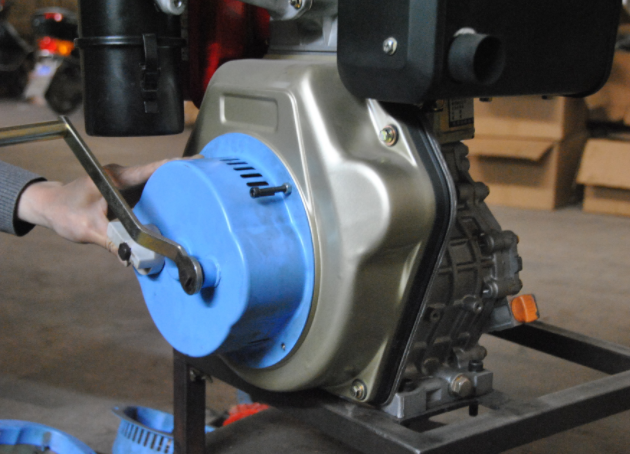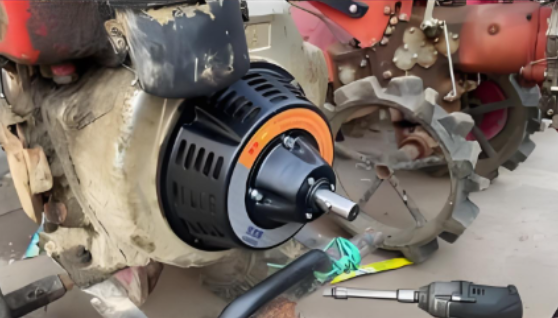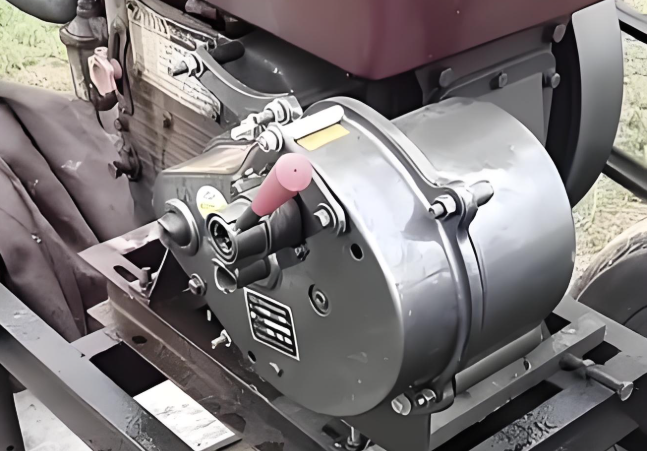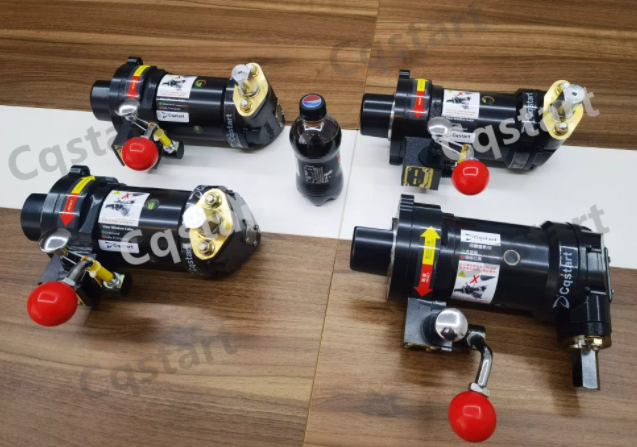Although modern engines mostly rely on electric start systems, with just one push of a button to start, there are still situations where the old-school hand crank starter shines in its own unique way.
In many small engine applications, such as generators in remote areas, water pumps on farms, or outdoor machinery, hand crank starter is like a dependable old friend: no electricity needed, unfazed by harsh conditions, always ready to start when you are.
However, is there an easier, more efficient way to start an engine? Absolutely. Let’s take a closer look at this classic starting method, along with its modern upgrade!
Part 1. What is Hand Crank Starter?
A hand crank starter is a purely mechanical engine starting device designed for small engines. Its core principle involves using human power to rotate a handle (crank), which drives the engine’s flywheel at high speed, reaching the required starting RPM to trigger fuel ignition and complete the starting process.
Compared to electric start systems, hand crank starter does not rely on batteries, wires, or any electronic components, making it especially suitable for situations with limited power supply, minimal maintenance conditions, or harsh environments.
It is widely used in single-cylinder or twin-cylinder diesel and gasoline engines, such as portable generators, water pumps, small agricultural machinery, and construction equipment.

Part 2. Which Small Engines Are Compatible with a Hand Crank Starter?
Hand crank starters are widely compatible with a variety of small engines, especially those that do not rely on batteries or electronic components. Below are some common types of small engines that can be paired with hand crank starters:
Diesel Engines:
Hand crank starters are commonly used for small-power diesel engines, particularly in environments where electricity is unreliable or unavailable. Common brands include:
- Yanmar: Small diesel engines widely used in agriculture, marine, and small industrial machinery.
- Kubota: Known for small diesel engines used in portable equipment, agricultural machinery, and small construction equipment.
- Perkins: Renowned for reliability and durability, suitable for light industrial machinery and agricultural equipment.
Gasoline Engines:
Hand crank starters are also ideal for many gasoline engines, especially those in devices that rely on simple mechanical systems, such as:
- Agricultural Irrigation Pumps: Many irrigation systems require small gasoline engines, which are often designed for easy manual starting, especially in remote areas.
- Portable Generators: Small generators for emergency power supply often feature hand crank starters, allowing for easy starting when there is no access to electrical power.
Industrial Machinery:
Hand crank starters are highly suitable for various industrial machines, particularly those that require high reliability and do not depend on electrical systems. For example:
- Air Compressors: Small portable air compressors often use hand crank starters, ensuring reliable startup even when there is no power supply at construction sites.
- Concrete Mixers: Small concrete mixers and other construction machinery commonly use hand crank starters to ensure startup in the absence of external power sources.
Marine Equipment:
Hand crank starters are especially useful for small marine engines, particularly in vessels that operate without electrical systems, such as:
- Small Fishing Boats: Many small fishing boats use hand crank starters for their engines, especially when battery or electrical systems are unreliable.
- Marine Equipment Without Electrical Systems: Small boats, lifeboats, and other marine engines can benefit from hand crank starters, ensuring they can be started without external power.

Part 3. Pros and Cons of Hand Crank Starter
Hand crank starters remain a trusted choice for many small engine users, especially in off-grid or rugged environments. While they offer several practical advantages, it’s also important to weigh their limitations.
Here’s a closer look at the key pros and cons of using a hand crank starter for small engines.
Pros of Hand Crank Starter:
No Dependence on Electricity: Hand crank starters do not require electricity, batteries, or any electronic components, making them ideal for environments with unreliable power supply or when electricity is unavailable.
Simple and Reliable: Being purely mechanical, hand crank starters are less prone to failure compared to electric starters, which can suffer from battery issues, wiring faults, or other electrical problems. They provide a reliable starting method, especially in harsh conditions.
Cost-Effective: Hand crank starters are generally less expensive than electric start systems, which require batteries, wiring, and other electronic parts. This makes them a more budget-friendly option for small engines.
Low Maintenance: With fewer components and no need for electrical systems, hand crank starters are easy to maintain and repair. There is less risk of expensive breakdowns or needing replacements compared to electric starters.
Ideal for Remote Locations: In remote or off-grid locations where access to electricity is limited, hand crank starters provide a practical and efficient solution for starting small engines like generators, water pumps, and agricultural equipment.

Cons of Hand Crank Starter:
Physical Effort Required: Hand crank starters require manual effort to operate. Depending on the engine size, it may take considerable force to turn the crank, which can be tiring, especially for larger engines or frequent use.
Limited to Smaller Engines: Hand crank starters are typically suited for smaller engines. They may not be practical or efficient for larger engines that require more power to start.
Not Ideal for Frequent Use: For engines that need to be started frequently, the repetitive physical effort required for hand cranking may become inconvenient and tiring over time.
Potential for Injury: Improper handling or excessive force when cranking the engine could lead to injury. It’s important to follow safety procedures to prevent accidents.
Limited Automation: Unlike electric starters that can be engaged with a push of a button, hand crank starters require manual effort each time, which may be inconvenient in situations where speed and convenience are important.
Part 4. Spring Starter: A Smarter Alternative to Hand Crank Starter
In certain applications, users not only want to avoid relying on electricity but also prefer to skip the physical effort of manually cranking an engine, while ensuring maximum safety. In these scenarios, a Spring Starter offers a more efficient, labor-saving, and safer option.
Take the Cqstart 7 Series Spring Starter (Under 2L) for example. This product is specifically designed for small engines with displacements of 2L or less, combining portability, reliability, and powerful starting performance. It is widely used in generator sets, small diesel pumps, and spaces that are constrained environments, particularly on offshore platforms.
Key Advantages of Cqstart Spring Starter:
- No Battery Required: Like a hand crank starter, it’s fully mechanical and requires no electrical power system.
- No Continuous Manual Effort: Simply pre-wind the spring and release—starting the engine quickly and easily with minimal effort.
- Stable and Reliable Start: Compatible with various small diesel and gasoline engines, delivering smooth and dependable performance.
- Compact and Easy to Install: Standard interface provided; custom mounting plates supported for different engine configurations.
- Built for Harsh Conditions: Explosion-proof, waterproof, and capable of operating reliably in low-temperature environments.
Compared to traditional hand crank starters, spring starters are better suited for users who demand higher efficiency and operational ease of operation, especially in applications involving frequent starts or multiple units.
If you’re seeking a high-performance starting solution for small engines that requires no electricity or manual cranking, Cqstart Spring Starter for small engine is the ideal choice.

Final Words
In many situations, including outdoor, remote, and extreme environments, a hand crank starter remains an essential solution for starting small engines. Its simplicity, reliability, and practicality make it a dependable choice for ensuring your equipment runs smoothly.
However, if you’re looking for a more effortless and efficient option without relying on electricity, spring starter offers the perfect upgrade – ideal for frequent starts or challenging conditions.

